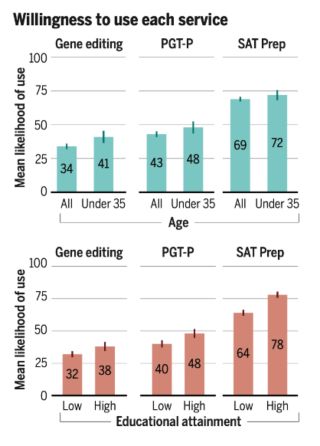Genetics
Elites Publicly Condemn What They Privately Support
It's hard to gauge public beliefs about new technologies.
Posted April 19, 2023 Reviewed by Lybi Ma
Key points
- People are ambivalent about using reproductive technology to shape their children’s traits.
- A new survey shows many Americans would genetically enhance their kids if the risks were low.
- Preference cascades are powerful; as more people accept the technology, more will use it. But first it will be condemned by elites.
Technology is a tool. It is only as good or bad as what it is used for.
Nuclear energy can produce reliable power at a low cost. But the technology that enables nuclear energy can be used to build nuclear weapons in North Korea. Vaccines have saved billions of lives over the past century. But gain-of-function research intended to create new vaccines may be the origin of the Covid-19 virus.
The same goes for technologies that will allow us to shape the traits of our children through embryo selection. As I outlined in a previous post, embryo selection using genetic tests will soon allow parents to select against various diseases and in favor of aesthetic and cognitive traits, including the genetic basis of IQ and eventually personality.
What do people think about this technology now, and how might their attitudes change?
Public Attitudes about Embryo Selection
The journal Science recently published a survey on American public opinion about technologies that may boost IQ. The poll asked three questions:
- Would you use tutoring to boost your kids’ chances of being accepted to an elite university?
- Would you use gene editing to boost your kids’ chance of being accepted to an elite university?
- Would you use embryo selection to boost your kids’ chance of being accepted to an elite university?

While most people said they would use tutoring to boost their kids’ academic performance, nearly half also expressed a willingness to use embryo selection.
Pollsters also asked whether people would be more likely to use the technology if 90 percent of those around them used it. This made people more willing to say they would use it.
What should we conclude from these results?
How Taboos Influence Beliefs
Polls can be deceptive. The way questions are asked can influence people’s answers. And sometimes people lie to pollsters: When they support a candidate who is not popular, for example, people sometimes falsify their stated preference. However, a well-crafted poll with clear questions, an adequate sample size, and a credible assurance of privacy will tend to reveal what people really believe.
But what happens when the people polled don’t have strong beliefs? This is likely the case with new technologies. In these cases, people form their beliefs about new technology by seeing what socially influential people say. Let’s call these influential people “elites.”
Elite opinion is transmitted via movies, news stories, and university lectures. It is not surprising that elite opinion in the US is different than elite opinion in South Asia or the Middle East. Especially when it comes to attitudes about dramatic new technologies like AI, embryo selection, or gene editing. Why are people in Europe and the US especially likely to greet embryo selection with skepticism or even abhorrence?
The Second World War marked a major cultural shift in the West.
The Allies’ victory in 1945 signaled the coming hegemony of Anglo-American media and educational institutions. The elites who ran these institutions began to reject any ideas they associated with Nazi ideology.
For example, social scientists and journalists in the US and UK erected taboos around research that suggested genetics plays a major role in explaining human differences. Rather than emphasize how genes shape human differences, today’s elites often endorse a “blank slate” view of human nature – the view that only oppression or poverty or culture can explain differences in achievements or outcomes.
The intellectual taboos that emerged after WW2 make perfect sense, given the horrors of the Holocaust, and the claims of biological superiority that helped enable it.
But it is likely that these taboos against genetic explanations of human differences will change, especially as technologies like embryo selection become more powerful.
Private Truths and Public Lies
Because elites compete among themselves for cultural power, they often try to outdo one another in affirming whatever the dominant ideology expects them to say. If the ideology says that men and women are morally equal, a journalist may go further and say not only that they’re morally equal, but that men and women are biologically identical as well.
While this view is demonstrably false, it makes perfect sense that a professor or journalist would publicly endorse it. They are, after all, not so much describing reality as affirming their fealty to an ideology.
Given the taboos against appealing to genetic differences to explain human differences, we should expect elites to publicly condemn the use of embryo selection, especially for aesthetic and cognitive traits. The reason is that any ability to influence these traits in embryos implicates the power of genetics in explaining social outcomes. Consequently, some elites will declare that the technology is scientifically infeasible; others will say it’s scientifically feasible but morally wrong.
When elites vying for power within institutions like The New York Times or Yale University speak about controversial issues, it is hard to trust whether their publicly stated views are sincere. After all, public pronouncements are often a case of preference falsification. This occurs when there are incentives to publicly lie to avoid social penalties.
Even when their statements are sincere, elites who are steeped in an ideology are likely to exhibit motivated reasoning: they sincerely believe falsehoods because the social incentives, such as keeping their job at the newspaper or the university , lead them in this direction.
Putting these pieces together, what will happen when genetic technologies like embryo selection using polygenic scores allow us to shape the psychological traits of our kids?
First, many elites in the West will publicly denounce the technology, even if they privately use it.
Second, as the science of heritability is better understood by the public, there will be a growing chasm between what people privately believe and are publicly expected to say.
Third, as the gap between public proclamations and private understanding grows larger, some people will stop lying in public, initially at a cost to themselves.
Finally, as more elites publicly affirm the feasibility and desirability of using embryo selection for complex traits, more people will change their minds.
A preference cascade will then lead ordinary people to move from suspicion and condemnation to acceptance and endorsement. Once this occurs – if this occurs – the trajectory of human civilizations will change forever.




